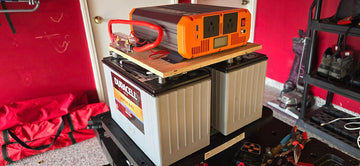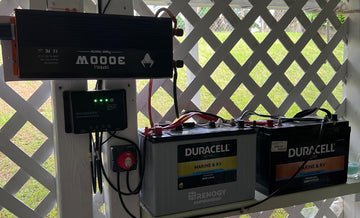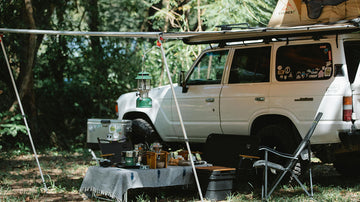As an important solution for energy storage, lithium-ion battery banks are widely used in home backup power, outdoor adventure equipment, industrial equipment and various portable electronic devices. Choosing the right battery bank capacity is not only related to the endurance of the device, but also directly affects the cost, safety and overall experience. Therefore, it is especially important to define their own needs and reasonably determine the capacity of lithium-ion battery banks. In this article, we will discuss how to choose the right battery bank capacity according to the actual needs, to help you make a wise decision.
What is a Battery Bank
A Battery Bank is a system consisting of two or more batteries combined through electrical connections. According to the different connection methods, Battery Bank can be divided into series connection and parallel connection.
Series connection
In series connection, the batteries are connected sequentially, with the positive terminal connected to the negative terminal. The main advantage of this type of connection is that it increases the total voltage of the Battery Bank. For example, if you connect two 12-volt batteries in series, you will get a 24-volt Battery Bank. This configuration is suitable for devices that require higher voltages.
Parallel Connection
In a parallel connection, the positive terminals of all the batteries are connected together and the negative terminals are also connected together. The main advantage of this type of connection is that the total capacity of the Battery Bank (Ampere hours, Ah) can be increased while the voltage remains the same. For example, if you connect two 12-volt, 100 amp-hour batteries in parallel, you will get a 12-volt, 200 amp-hour Battery Bank. This configuration is suitable for devices that require longer usage time.
Advantages of a Battery Bank
- Greater energy storage capacity: By combining multiple Battery Banks together, a Battery Bank can provide greater energy storage capacity for high power consumption devices.
- Longer usage time: Battery Banks can provide longer power supply time for devices, especially in applications that require continuous power, such as solar battery banks, UPS (Uninterruptible Power Supply), etc.
- Flexible Configuration: Users can choose the appropriate number of batteries and connection methods to achieve the required voltage and capacity according to specific needs.
Understanding Battery Capacity
The capacity of a lithium-ion Battery Bank is usually expressed in Ampere-hours (Ah), which reflects the product of the amount of current the battery is able to deliver under certain conditions and the time it takes to do so. In short, the higher the capacity, the longer the battery can continue to supply power. However, capacity is not the only determinant of range, as the power requirements of the device, the battery voltage and the environment in which it is used are also critical. Lithium-ion Battery Banks are available in capacities ranging from a few amp-hours to several hundred amp-hours, and the choice needs to be weighed according to the specific application scenario.
How to determine the required battery capacity
Assess your energy needs
Identify power consumption: list the appliances and equipment in your home or workplace and find the average power consumption of each. For example, refrigerators, air conditioners, TVs and their power.
Estimate daily energy consumption: Multiply the power of each device by the number of hours it is used to calculate the total daily power consumption in watt-hours (Wh). For example, if a refrigerator uses 120W and operates 24 hours a day, the energy consumed is 120W × 24h = 2880Wh.
Consider future energy demand: If you plan to add new equipment or change your usage habits, you need to consider the impact of these changes on total electricity demand.
Calculate the required battery capacity
Use a formula to determine capacity: Battery capacity can usually be estimated using the following simple formula:
Required capacity (Wh) = Energy consumption per day (Wh) ÷ Deep discharge ratio (DoD)
For example, if the daily energy consumption is 5000Wh and you have chosen a Depth of Discharge ratio of 80%, then the required battery capacity is 6250Wh.
Consider the DoD ratio: Li-ion batteries usually have a high DoD ratio, commonly between 70% and 80%, which means that their capacity cannot be fully used each time they are discharged.
Consider efficiency loss: There is energy loss during charging and discharging, so this needs to be taken into account in the calculation. Generally, assuming 80% charging efficiency is a conservative choice.
Example calculation
Assuming your total daily energy consumption is 5000Wh and you are using a battery with a depth discharge ratio of 80%, the required battery capacity is 6250Wh.
To convert the battery capacity from Watt-hours (Wh) to Amp-hours (Ah), you need to know the voltage (V) of the battery. The conversion formula is as follows:
Ampere-hours (Ah) = Watt-hours (Wh) / Voltage (V)
Assuming your Battery Bank voltage is 12 Volts (V), the required battery capacity is calculated as follows:
Required Battery Capacity (Ah) = 6250Wh/12V = 520.83Ah
Additional Factors to Consider
- Charging method and speed: the choice of charging system will affect the charging efficiency and speed, need to ensure that the charging system is compatible with the Battery Bank.
- Temperature and environmental impact on capacity: Li-ion batteries degrade in extreme temperatures, so batteries need to be used and stored in a suitable environment.
- Safety considerations: Lithium batteries may be a safety hazard if they are subjected to high temperatures or over-discharged or charged, so the health of the battery needs to be checked regularly.
What is a High Capacity Battery
High-capacity batteries are batteries with a high energy storage capacity, often measured in watt-hours (Wh) or amp-hours (Ah). These batteries are capable of storing more electrical energy and are suitable for devices and applications that require power for extended periods of time or high power output. The main characteristics of high-capacity batteries include high storage capacity, long usage time, and wide applicability, and they are commonly used in electric vehicles, energy storage systems (e.g., solar energy storage), and uninterruptible power supplies (UPS).
High-capacity batteries can be divided into various types, such as lithium batteries, lead-acid batteries and nickel-metal hydride batteries. Their common advantages are high energy density, improved efficiency and better economics, making them ideal for many high energy consumption applications. Despite the many advantages of high-capacity batteries, their use requires attention to charging time, weight and size, as well as safety under high-power operation. These factors influence the selection and application of batteries to ensure that they are used safely and efficiently while meeting energy requirements.
Common lithium-ion battery capacities and applications
Below is a table of common lithium-ion battery capacities in Ampere-hours (Ah) and their application areas:

Best Lithium Battery Recommendation
12V 100AH LiFePO4 Lithium Battery for Trolling Motors, Solar System, Marine, RV, Boat

This LiFePO4 (Lithium Iron Phosphate) battery has an excellent lifespan of 8 to 10 times longer than traditional lead-acid batteries, with between 2,000 and 5,000 cycles, compared to 300 to 500 cycles for lead-acid batteries. In addition, LiFePO4 batteries have twice the usable capacity of lead-acid batteries and weigh 30 per cent less due to their higher energy density. Since there is no memory effect, these batteries are better able to hold their charge when not in use and do not lose capacity due to their previous state of discharge. In addition, the built-in Battery Management System (BMS) protects the battery against overcharging, overdischarging, overcurrent, and short-circuit, and is equipped with a high-temperature cut-off function to further enhance safety.
The 100Ah LiFePO4 battery offers several advantages, making it particularly suitable for applications that require reliable and continuous power. The battery supports peak currents of up to 350A, making it ideal for high-demand uses such as electric vehicles and energy storage systems. Its capacity expansion flexibility allows multiple cells to be connected in parallel or series to meet specific power needs, enabling higher voltages and capacities. This makes the 100Ah model particularly suitable for domestic energy storage, UPS backup and outdoor leisure use in RVs, boats and campervans, providing consistent performance in a variety of conditions. Overall, the 100Ah LiFePO4 battery offers a good balance of capacity, efficiency and safety for a wide range of residential and commercial applications.
Maintenance and Service Life
Maintenance Best Practices: Regularly check your Battery Bank's state of charge, wiring, and temperature environment to ensure proper operation.
Understanding Battery Life and Decline Rates: Lithium batteries typically have a long lifespan, but they can still decline with the number of cycles and over time. It is important to understand the life cycle and health indicators of your battery.
Signs of Battery Bank Failure and Timing of Replacement: If the Battery Bank is showing a significant drop in capacity, heating or leaking, it is an indication that it needs to be replaced.
Conclusion
With the above, we have learnt how to assess and calculate the required lithium battery capacity. When choosing a Li-ion Battery Bank, it is crucial to fully understand one's energy needs, calculate the required capacity, and consider battery configuration and maintenance. We hope that every reader will make an informed choice based on his or her situation to ensure a stable and safe power supply.













